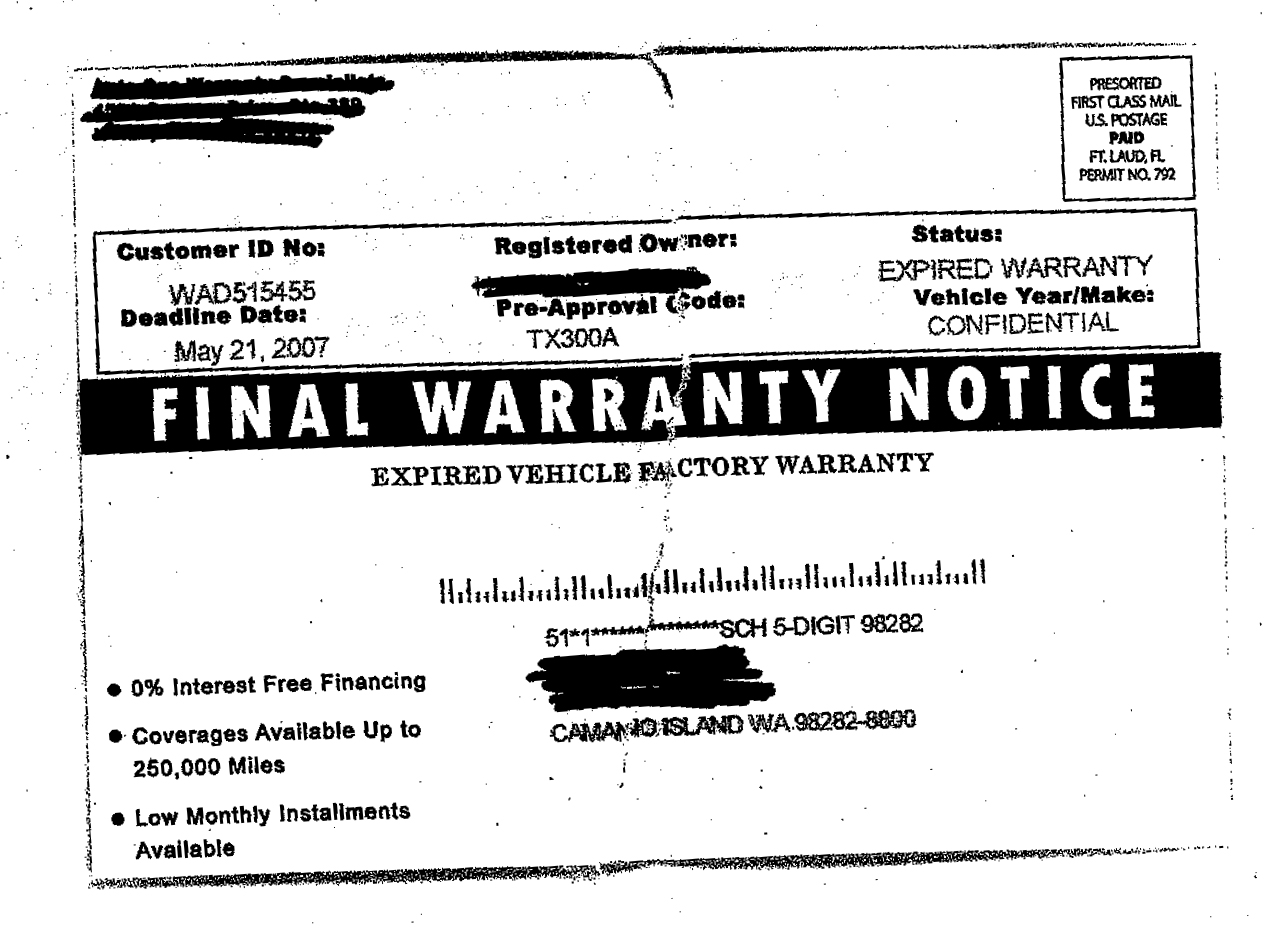SEATTLE – The official-looking postcard in your mailbox warns that your car’s warranty is about to expire and urges you to call a toll-free number to ensure you’re covered. But think twice before you dial. The Attorney General’s Consumer Protection Division says these mailers are advertisements aimed at pressuring you into buying an expensive service contract.
The Washington Attorney General’s Office, like other agencies throughout the country, has noticed an increase in consumer complaints concerning postcards and telemarketing calls from out-of-state companies offering extended warranties. Businesses design their mailers to look like official notices from your vehicle manufacturer with phrases like “FINAL WARRANTY NOTICE.” Many postcards are personalized with the car owner’s name and a “customer ID” number.
“If you receive a postcard warning you to renew your vehicle warranty, don’t take the information on face value,” said Assistant Attorney General Mary Lobdell. “Your car or truck’s initial warranty may be far from expiring or may have expired long ago. These notices usually aren’t from your manufacturer or dealer; they’re ads from businesses that want to sell you an optional, pricey plan to cover future repairs.”
If you do want to purchase an extended warranty – more accurately known as a service contract – always shop around and know exactly what it is you are buying. You may be able to get a similar or better contract from your vehicle manufacturer or another business. Here’s what to look for:
1. What is covered?
A service contract, like a warranty, provides repairs and/or maintenance for a specific time period. Read the contract carefully before you pay. Exemptions tend to be broad so if the contract doesn’t specifically say something is covered, you should assume that it isn’t. Get all promises in writing.
A Washington law requires that all service agreements sold after Sept. 30, 2006, state all parts covered by the contract and any conditions required to maintain coverage. The contract can’t deny a claim based on the consumer’s failure to properly maintain the vehicle – excluding the failed part.
The law also allows you to return the service agreement within 30 days of purchase if you haven’t made a claim. If you return the contract with 10 days, you will receive a full refund. After that, you can receive a prorated refund and a $25 cancellation fee may be charged.
Check the agreement carefully. Some consumers who purchased service agreements for used cars actually received contracts for new cars that had less-favorable terms, including a shorter coverage period.
2. Is it worth the price?
Buying a service contract is like buying peace of mind; the real value depends on whether you use it.
The condition and quality of your car can help determine whether you may need repairs and how much those repairs are likely to cost. One alternative is to “self-insure” with the money you don’t spend on service contracts. In other words, put the cash aside to pay for repairs if/when you need them.
Service contract prices are usually negotiable, so don’t be afraid to barter. Know that the price you pay may not be the total cost. Service contracts, like insurance policies, often require you to pay a deductible before the coverage kicks in. Or you may be charged each time the item is serviced.
When shopping for a car, you should negotiate a service contract separately from the vehicle price and financing.
Every used car sold by a dealer in Washington for personal use has an "implied warranty of merchantability” under state law. This means that the dealer promises the used car will be fit for ordinary driving purposes, reasonably safe, without major defects, and of the average quality of similar cars available for sale in the same price range. The implied warranty can’t be waived for a used car if you buy an extended service warranty from the dealer within 90 days.
3. Where can you get service?
Some plans are only good at certain dealers or repair shops. Towing costs may not be covered.
4. How reputable is the company selling the contract?
Companies that provide service contracts sometimes go out of business and are unable to repay claims. Ask your mechanic shop whether they have heard of the company and whether they will honor the contract. Check out the business’ complaint history with the Better Business Bureau. Be sure your contract includes the company’s address and phone number in case you need to contact someone.


- 30 –
Media Contacts: Kristin Alexander, Media Relations Manager – Seattle, (206) 464-6432
Mary Lobdell, Assistant Attorney General, (253) 593-2256

 Other Languages
Other Languages